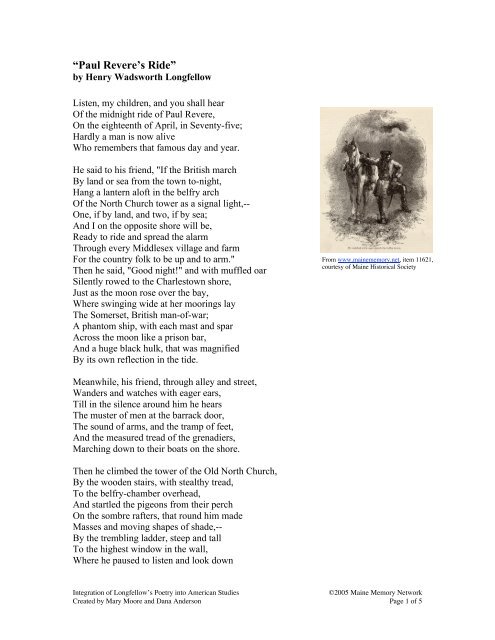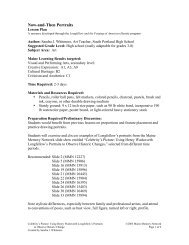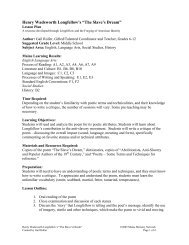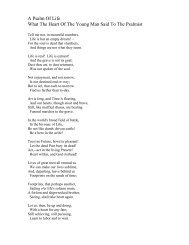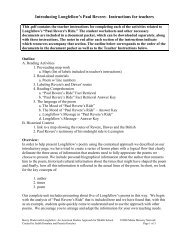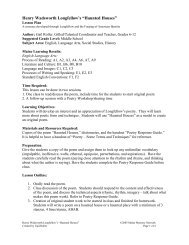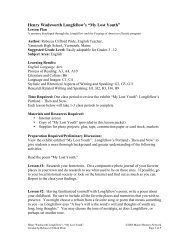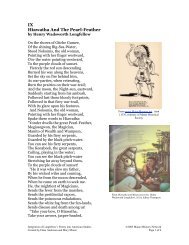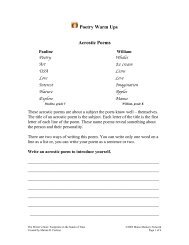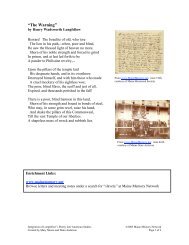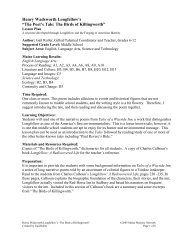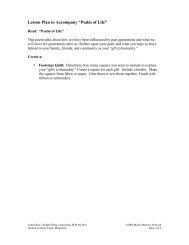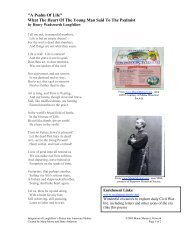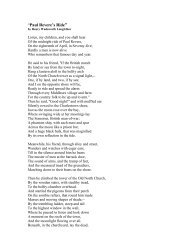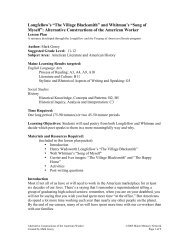“Paul Revere's Ride” - Henry Wadsworth Longfellow
“Paul Revere's Ride” - Henry Wadsworth Longfellow
“Paul Revere's Ride” - Henry Wadsworth Longfellow
Create successful ePaper yourself
Turn your PDF publications into a flip-book with our unique Google optimized e-Paper software.
<strong>“Paul</strong> Revere’s <strong>Ride”</strong><br />
by <strong>Henry</strong> <strong>Wadsworth</strong> <strong>Longfellow</strong><br />
Listen, my children, and you shall hear<br />
Of the midnight ride of Paul Revere,<br />
On the eighteenth of April, in Seventy-five;<br />
Hardly a man is now alive<br />
Who remembers that famous day and year.<br />
He said to his friend, "If the British march<br />
By land or sea from the town to-night,<br />
Hang a lantern aloft in the belfry arch<br />
Of the North Church tower as a signal light,--<br />
One, if by land, and two, if by sea;<br />
And I on the opposite shore will be,<br />
Ready to ride and spread the alarm<br />
Through every Middlesex village and farm<br />
For the country folk to be up and to arm."<br />
Then he said, "Good night!" and with muffled oar<br />
Silently rowed to the Charlestown shore,<br />
Just as the moon rose over the bay,<br />
Where swinging wide at her moorings lay<br />
The Somerset, British man-of-war;<br />
A phantom ship, with each mast and spar<br />
Across the moon like a prison bar,<br />
And a huge black hulk, that was magnified<br />
By its own reflection in the tide.<br />
Meanwhile, his friend, through alley and street,<br />
Wanders and watches with eager ears,<br />
Till in the silence around him he hears<br />
The muster of men at the barrack door,<br />
The sound of arms, and the tramp of feet,<br />
And the measured tread of the grenadiers,<br />
Marching down to their boats on the shore.<br />
Then he climbed the tower of the Old North Church,<br />
By the wooden stairs, with stealthy tread,<br />
To the belfry-chamber overhead,<br />
And startled the pigeons from their perch<br />
On the sombre rafters, that round him made<br />
Masses and moving shapes of shade,--<br />
By the trembling ladder, steep and tall<br />
To the highest window in the wall,<br />
Where he paused to listen and look down<br />
From www.mainememory.net, item 11621,<br />
courtesy of Maine Historical Society<br />
Integration of <strong>Longfellow</strong>’s Poetry into American Studies ©2005 Maine Memory Network<br />
Created by Mary Moore and Dana Anderson Page 1 of 5
A moment on the roofs of the town,<br />
And the moonlight flowing over all.<br />
Beneath, in the churchyard, lay the dead,<br />
In their night-encampment on the hill,<br />
Wrapped in silence so deep and still<br />
That he could hear, like a sentinel's tread,<br />
The watchful night-wind, as it went<br />
Creeping along from tent to tent<br />
And seeming to whisper, "All is well!"<br />
A moment only he feels the spell<br />
Of the place and the hour, and the secret dread<br />
Of the lonely belfry and the dead;<br />
For suddenly all his thoughts are bent<br />
On a shadowy something far away,<br />
Where the river widens to meet the bay,--<br />
A line of black that bends and floats<br />
On the rising tide, like a bridge of boats.<br />
Meanwhile, impatient to mount and ride,<br />
Booted and spurred, with a heavy stride<br />
On the opposite shore walked Paul Revere.<br />
Now he patted his horse's side,<br />
Now gazed at the landscape far and near,<br />
Then, impetuous, stamped the earth,<br />
And turned and tightened his saddle girth;<br />
But mostly he watched with eager search<br />
The belfry-tower of the Old North Church,<br />
As it rose above the graves on the hill,<br />
Lonely and spectral and sombre and still.<br />
And lo! as he looks, on the belfry's height<br />
A glimmer, and then a gleam of light!<br />
He springs to the saddle, the bridle he turns,<br />
But lingers and gazes, till full on his sight<br />
A second lamp in the belfry burns!<br />
A hurry of hoofs in a village street,<br />
A shape in the moonlight, a bulk in the dark,<br />
And beneath, from the pebbles, in passing, a spark<br />
Struck out by a steed flying fearless and fleet:<br />
That was all! And yet, through the gloom and the light,<br />
The fate of a nation was riding that night;<br />
And the spark struck out by that steed, in his flight,<br />
Kindled the land into flame with its heat.<br />
He has left the village and mounted the steep,<br />
And beneath him, tranquil and broad and deep,<br />
Integration of <strong>Longfellow</strong>’s Poetry into American Studies ©2005 Maine Memory Network<br />
Created by Mary Moore and Dana Anderson Page 2 of 5
Is the Mystic, meeting the ocean tides;<br />
And under the alders, that skirt its edge,<br />
Now soft on the sand, now loud on the ledge,<br />
Is heard the tramp of his steed as he rides.<br />
It was twelve by the village clock,<br />
When he crossed the bridge into Medford town.<br />
He heard the crowing of the cock,<br />
And the barking of the farmer's dog,<br />
And felt the damp of the river fog,<br />
That rises after the sun goes down.<br />
It was one by the village clock,<br />
When he galloped into Lexington.<br />
He saw the gilded weathercock<br />
Swim in the moonlight as he passed,<br />
And the meeting-house windows, blank and bare,<br />
Gaze at him with a spectral glare,<br />
As if they already stood aghast<br />
At the bloody work they would look upon.<br />
It was two by the village clock,<br />
When he came to the bridge in Concord town.<br />
He heard the bleating of the flock,<br />
And the twitter of birds among the trees,<br />
And felt the breath of the morning breeze<br />
Blowing over the meadows brown.<br />
And one was safe and asleep in his bed<br />
Who at the bridge would be first to fall,<br />
Who that day would be lying dead,<br />
Pierced by a British musket-ball.<br />
You know the rest. In the books you have read,<br />
How the British Regulars fired and fled,--<br />
How the farmers gave them ball for ball,<br />
From behind each fence and farm-yard wall,<br />
Chasing the red-coats down the lane,<br />
Then crossing the fields to emerge again<br />
Under the trees at the turn of the road,<br />
And only pausing to fire and load.<br />
So through the night rode Paul Revere;<br />
And so through the night went his cry of alarm<br />
To every Middlesex village and farm,--<br />
A cry of defiance and not of fear,<br />
Integration of <strong>Longfellow</strong>’s Poetry into American Studies ©2005 Maine Memory Network<br />
Created by Mary Moore and Dana Anderson Page 3 of 5
A voice in the darkness, a knock at the door,<br />
And a word that shall echo forevermore!<br />
For, borne on the night-wind of the Past,<br />
Through all our history, to the last,<br />
In the hour of darkness and peril and need,<br />
The people will waken and listen to hear<br />
The hurrying hoof-beats of that steed,<br />
And the midnight message of Paul Revere.<br />
Enrichment Links:<br />
Maine Memory Network slideshow “Liberty Threatened” discusses Peleg<br />
<strong>Wadsworth</strong> in relation to Paul Revere’s court marshal case:<br />
www.mainememory.net<br />
Dana Gioia’s essay on <strong>Longfellow</strong>:<br />
www.danagioia.net/essays/elongfellow.htm<br />
Primary document – A letter from Col. Paul Revere to the Corresponding<br />
Secretary about his ride to Lexington:<br />
http://www.masshist.org/cabinet/april2002/reveretranscription.htm<br />
Integration of <strong>Longfellow</strong>’s Poetry into American Studies ©2005 Maine Memory Network<br />
Created by Mary Moore and Dana Anderson Page 4 of 5
Central guiding questions:<br />
1. What part(s) of this poem reflect <strong>Henry</strong> <strong>Wadsworth</strong> <strong>Longfellow</strong>’s attempt to<br />
define American identity?<br />
2. What is <strong>Longfellow</strong>’s message in his poem and is this message still relevant<br />
today?<br />
3. Looking at his message, what qualities and values as a person do you think HWL<br />
lived by?<br />
4. Describe <strong>Longfellow</strong>’s voice in this poem and how does it reflect his message?<br />
5. Which images in the poem strengthen/illuminate <strong>Longfellow</strong>’s message?<br />
6. What traditional poetic conventions (i.e. rhyme, simile, meter, etc.) can you<br />
identify in this poem? Do they enhance your appreciation for the poem?<br />
Integration of <strong>Longfellow</strong>’s Poetry into American Studies ©2005 Maine Memory Network<br />
Created by Mary Moore and Dana Anderson Page 5 of 5


